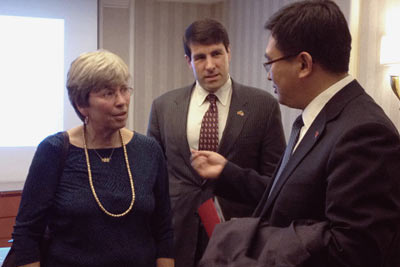Pell stresses need to boost international engagement
By Claire Lambrecht

Cornell is redefining international education and research for the globalized age, according to Alice Pell, vice provost for international relations, at a sold-out presentation at the Cornell Club in New York City April 12, where ILR School's Sarosh Kuruvilla also presented. "People don't have to sit in straight lines for their brains to work," said Pell. "They can have field experiences, they can do internships, they can work, they can do research, and they can do independent studies."
In his March 2 white paper, "Bringing Cornell to the World and the World to Cornell," President David Skorton set a goal that at least half of Cornell undergraduates have an international experience before they graduate.
"We're really looking at what initiatives should be continued, how they need to be changed and what are promising new directions," Pell said.
While the university has a long history of international engagement -- including longstanding programs in Kirtipur, Nepal, and Rome, Italy -- currently just 27 percent of Cornell students study overseas before graduation, compared with 35 to 40 percent at Harvard and Yale and 65 percent at Dartmouth.
Rather than mandating increased study abroad, Cornell is working, Pell said, to strengthen partnerships with leading universities, NGOs, governments and private sector organizations to tailor programs to meet the needs of students' academic interests.
The global health minor in the College of Human Ecology, for example, has been wildly popular with students, Pell said. In addition to coursework in Ithaca -- which includes such courses as Principles of Virology and Economics of Public Health -- the program requires students to complete an eight-week field experience.
To illustrate the range of programs available to students, Sarosh Kuruvilla, professor of industrial relations, Asian studies and public affairs and director of ILR International Programs, discussed the ILR School's efforts to promote international exchange.
In addition to internships at the International Labor Organization in Geneva, Switzerland, and service learning opportunities in Mysore, India, ILR recently launched its Global Scholars Program. More than a minor, the program requires a significant international experience, coursework, foreign language proficiency and a paper reflecting on the experience.
"The global scholars program is something new that we think a lot of people will dig into," said Kuruvilla.
In a broader sense, Cornell has been producing global scholars for decades.
"One of the things we've noticed is that Cornell is all over the world. If you threw a dart at a map of the world, you'd hit a Cornellian," said Matthew Palumbo '83, who organized the event. "We're in 177 countries."
Support for Cornell's global endeavors was evident in the audience, which included two dozen alumni and friends, such as Kent Hubbell '69, dean of students; Gligor Tashkovich '87, MBA '91, retired minister for foreign investment in the Republic of Macedonia; Charles P. Wang, co-founder of the Committee of 100, a nonpartisan organization focused on addressing issues important to the Chinese-American community; and two members of the education section of the Consulate General of the People's Republic of China.
Claire Lambrecht '06 is a freelance writer based in New York.
Get Cornell news delivered right to your inbox.
Subscribe